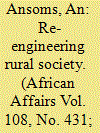| Srl | Item |
| 1 |
ID:
157372


|
|
|
|
|
| Summary/Abstract |
Re-engineering job and employment is not an issue but it is a need for man power utilization for the development of the country. It has focussed on the four key points - Opportunity re-engineering, Re-engineering learner’s competency, Capacity re –engineering and Readiness for country needs. This article has covered the technical parameters for re-engineering job and their outcomes for nation building.
|
|
|
|
|
|
|
|
|
|
|
|
|
|
|
|
| 2 |
ID:
087723


|
|
|
|
|
| Publication |
2009.
|
| Summary/Abstract |
This article analyses the Rwandan elite's visions and ambitions for a wide-ranging re-engineering of rural society. The post-1994 political elite has few links to rural society and the peasant way of life, and sees little room for small-scale peasant agriculture in Rwanda's economic future. The article shows how current Rwandan policy makers aim to realize three social engineering ambitions: first, to transform the agricultural sector into a professionalized motor for economic growth, centred on competitive and commercial farm units; second, to artificially upgrade rural life by inserting 'modern' techniques and strategies into local realities, while hiding true poverty and inequality; and, finally, to transform Rwanda into a target-driven society from the highest to the lowest level. The article points to the (potential) dangers, flaws, and shortcomings of this rural re-engineering mission, and illustrates how the state as the engineer 'hovers' above the local without consulting those affected. It concludes that contemporary polices are unlikely to be conducive to poverty reduction.
|
|
|
|
|
|
|
|
|
|
|
|
|
|
|
|